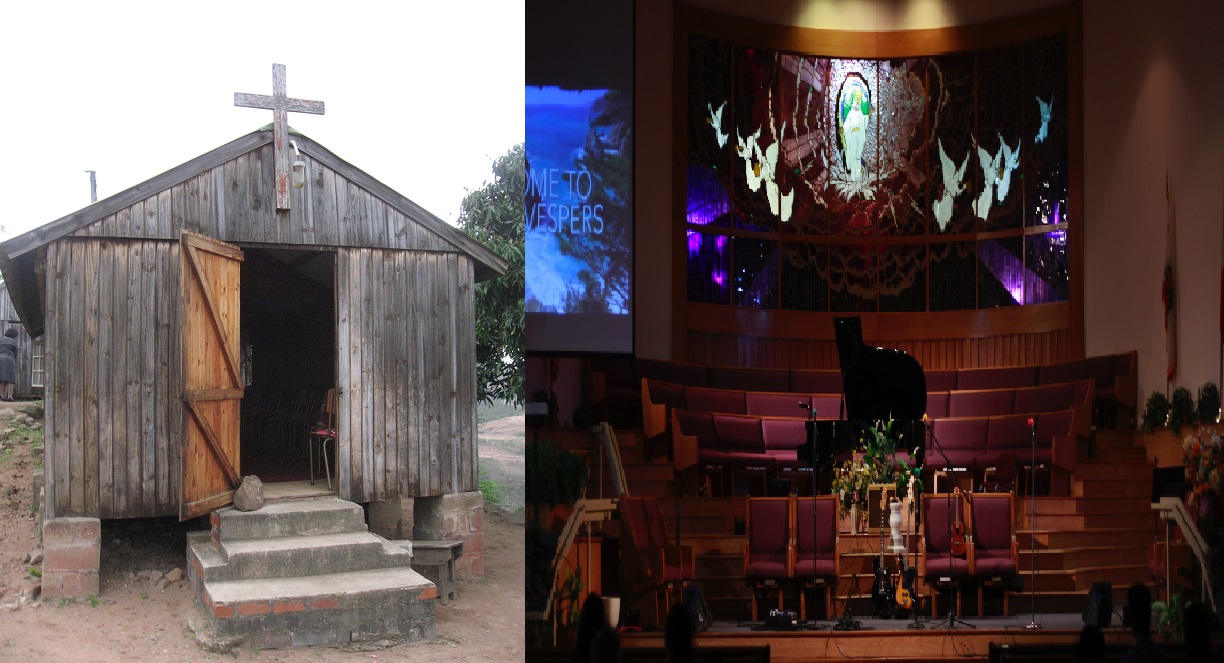
Stephen
Terry, Director

Offerings
of Gratitude
Commentary
on the March 3, 2018 Sabbath School Lesson
 Our desire is not that others might be
relieved while you are hard pressed, but that there might be equality. At the
present time your plenty will supply what they need, so that in turn their
plenty will supply what you need. The goal is equality, as it is written: “The
one who gathered much did not have too much, and the one who gathered little
did not have too little.” 2 Corinthians 8:13-15, NIV
Our desire is not that others might be
relieved while you are hard pressed, but that there might be equality. At the
present time your plenty will supply what they need, so that in turn their
plenty will supply what you need. The goal is equality, as it is written: “The
one who gathered much did not have too much, and the one who gathered little
did not have too little.” 2 Corinthians 8:13-15, NIV
The Apostolic Church was more egalitarian in its genesis
than the institutional church we are familiar with today. We are told that they
held all things in common and everyone was cared for according to their need.[i] This was a very socialist model
of church praxis and was creating a new paradigm for how to structure a
society. This is not to say that such a fellowship did not need constant
prompting as evidenced by Paul’s reminder above to the Corinthian church. Could
you imagine such a socialist message being presented from any pulpit today?
Somewhere along the way, things apparently changed to a more capitalist model.
Whereas the apostolic church gave of their means to the church, knowing that
the church would see to their needs, today’s church takes the means from the
parishioners with the rejoinder. “God will bless you,” and then all but ignores
the needs of the members in the distribution of the funds collected.
As a result we find such disparate images as we find in this commentary’s
illustration to the left. We inhabit a Christian culture where some have more
than they need, while others do not even have the bare necessities to sustain a
meaningful quality of life. Globally this produces the sharp contrast seen
here. But the disparity is also local. We find churches raising tens or even
hundreds of thousands of dollars for church plant improvements ranging from
upholstered pews, air conditioning, state-of-the art
audio-visual systems, pianos, organs, to wall-to-wall carpeting while there may
be members of the same congregation who cannot afford their medicine, housing,
utilities or food. Unfortunately we live in an age when such members may be
characterized as lazy leeches, a drain on the resources of the church that is
neither welcomed nor encouraged.
Every day at Still Waters Ministry, we receive requests
for needs from Africa, Pakistan, India, the Philippines, as well as several
other places around the globe. The needs are dire, but we do not solicit offerings
so we have no real operating budget for our own needs, let alone those financial
needs around the world. God has blessed this ministry for almost 20 years to
keep operating, and we have an online presence in over 150 countries around the
world, but no funds in our pockets to pass on to others. In spite of that, it
saddens us to know that the necessary resources exist in the countries we
receive the request from but they are not made available. For instance, in
spite of the great need in the one of the regions I mentioned, the church on
the right is located in that region in the midst of the poverty endemic to the
work there. Apparently ostentation is more important than compassion for the
needy. Lest anyone think I am picking on that region, it is a worldwide
problem, even here in the United States. It is an inescapable fact that wealth
is unevenly distributed in our world, and many suffer as a result. The question
is, “Should the church model and facilitate that behavior, or have we been
called to something better?”
When we are parents of young children, we understand the
need for equality well. Who has not made sure when buying toys and gifts for
their children to buy something similar for each child so all feel equally
loved and cherished? And we learned to do this from how our parents treated us.
What happened then when we became adults and selfishness and greed came into
the picture? Is this how we interpret the freedom of choice that comes with
adulthood, a freedom to be as selfish as we wish since no one is there to tell
us not to? Are we adults raiding the cookie jar because now we own the jar? The
Apostolic Church told us this was wrong. The story of Ananias and Sapphira[ii] is a tale on point, for
it is a dramatic rebuke of selfishness intended to be a lesson to the rest of
the nascent church. Thinking to conceal that they held back funds for their own
support, they hoped to live off of the church distribution, cheating others in
need in the process. This kind of behavior would have been a severe crippling
blow to the early church if allowed to spread. Instead, the couple were
consumed by their own selfishness and dishonesty. Had they been honest and said
they were only making a partial gift, all would have been well, but they did
not want the church to know they were capable of supporting themselves. The apparent
lessons to be learned here are that the church is to care for those in need, no
one is to cheat the system, and all are to be treated equally before the Lord.
So why does the selfishness continue to exist in the
church? God must wonder if the death of Ananias and his wife were not enough to
convince us of the error of our ways, what more would it take. And do we figure
because God is not laying waste to every selfish congregation
that it is OK to be selfish? That would be presumption on a grand scale. We
perhaps do not realize that a chain is only as strong as its weakest link. If
we fail to support one another, even though our local church may have great
blessings of property and financial support, the Christian faith will crumble
at the very points we have chosen to neglect. Those who have suffered from that
neglect will be the loudest voices to condemn us when that day comes. When our
beautiful churches are thrown down, when our advanced technology we deemed
vital to spreading the word is on the rubbish heap, we may rue the day we chose
to accumulate things rather than care for people.
God has not held back in His attempts to teach us about
love, compassion and service, Even His only Son, Jesus, gave all He could give
on the cross. But we despised the message. We spat at Him and flipped Him off
as He hung, drawing His last breath. We did not want the selflessness He
proclaimed. We had our paths to power and riches. We knew how to play the
political game everyone was playing. We knew how to climb over the backs of
others to the top. It had been working for us for thousands of years. His sermons?
We didn’t need them. We had our own ideas. Little has changed. We know how to
do religion and make it prosper and become wealthy. We don’t need another
paradigm messing that up. But in spite of our effrontery, the passages at the
end of Acts chapters two and four still challenge us after all these centuries.
That early group of believers had an experience that emboldened them to subvert
the dominant paradigm, and even when the institutional church eventually caved
and accepted the selfishness that the world lived by, some have notably
continued to remain faithful to the experience of the Apostles. In the medieval
world the mendicant orders such as the Franciscans and the Dominicans sought to
keep the apostolic ideal alive. However, in time they too became tempted by the
desire for gain without regard to the need of those around them. This worked to
their disadvantage and instead of being retreats from the greed and selfishness
of the world, they became rich plumbs tempting rulers to plunder their monasteries.
The better path is for each of us to follow God’s
example and be perfect as He is.[iii] Some have interpreted
this passage to mean that we should be perfectly obedient to God’s law, usually
as expressed in the Decalogue. But the context of the passage does not even go
there. It speaks of God’s love and compassion for persons, both righteous and
unrighteous. That love, as we have already seen in the case of Jesus, is
selfless. To be perfect then is to seek to attain to that same selfless love in
gratitude for the love we ourselves received. We should not give of our means
to enrich a church or a denomination. Instead our gifts should be to bless
those in need as God’s gift blessed us in our great need. We do not need mighty
edifices, marvelous media systems, or music with powerful effects processors to
do that. In fact all of that may only hinder our ability to directly touch
hearts and lives. Instead we only need grateful, compassionate, loving hearts.
God has promised to give us those hearts.[iv] All we need to do is ask.
